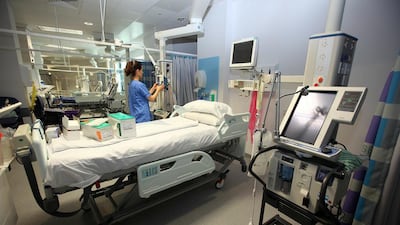In an episode of the classic situation comedy Hancock’s Half Hour, the great British comic actor Tony Hancock balefully scrutinises the evening meal served up by his landlady and observes: “I thought my mother’s cooking was bad, but at least her gravy used to move about a bit.”
I was reminded of his comment this week upon reading about the state of food served up to patients in NHS hospitals in the UK. In an organisation considered unparalleled throughout the world for its peerless health care, the quality of hospital catering has long been a standing joke and is the one aspect of health care that has remained stubbornly unresponsive to both modernisation and increased government funding.
You don’t have to read about it in the papers to get an idea of the parlous state of affairs. Merely visit any NHS hospital ward on any day of the week and you’ll see for yourself. Mass catering for sick people, each one with their own cultural preferences and different dietary requirements, is a difficult and time-consuming task. And if the old maxim is true that “you are what you eat”, then the fact that some hospital catering budgets allow for less than £3.80 (Dh23) per person per day speaks for itself.
And what catering it is. The squeak of the approaching meal trolley would be enough to send most of the patients running for the exits, if only they were fit enough to walk in the first place. Even if you’re hard of hearing you’re aware of its approach long before its arrival, due to the aroma of stewed vegetables and congealing meat inundating the air. With soggy carrots and pastry you could use as an offensive weapon, the meals are often so unappetising that if you weren’t feeling ill beforehand, you certainly will be now.
One recently discharged NHS patient described a plate of rice pudding she was recently offered during a stay at the Royal Free in north London, one of the flagship hospitals in the NHS (and the current home for William Pooley, the unfortunate individual being treated for the Ebola virus). “When I turned the plate upside down”, she reported, “the dessert stayed put”.
The inability to deliver freshly-cooked, nutritious and flavoursome food even extends to the facilities for visitors and relatives. Most NHS cafés are commercial franchises, offering little more than junk food dressed up in fancy packaging – calorific pastries, sugar-filled fruit drinks and the ubiquitous polystyrene container of fat-soaked chips. No wonder hospital visitors often look as ill as those they have come to support.
Well, at last the government has decided to act. This week, Jeremy Hunt, secretary of state for health, announced a fundamental reappraisal of the catering facilities in the NHS. New mandatory standards are to be introduced to ensure that hospitals either improve the quality of their foodstuffs, or face financial penalties and even loss of contracts. Hospital trusts, in particular, are to be ordered to emphasise healthier options rather than burgers, chips and pies. Salt, the ingredient responsible for high blood pressure and furred arteries, is no longer to be added to vegetables during the cooking process. Fresh fruit throughout the day will also be provided.
Hospitals unwilling to implement the required changes will be considered to be in breach of their NHS contracts, and a website is to be set up that will allow patients to judge for themselves the standard of the food on offer. Explaining the system, Mr Hunt said: “We are making the NHS more transparent, giving patients the power to compare food and incentivising hospitals to raise their game.”
Yet his initiative has already come in for criticism. Alex Jackson, coordinator of the Campaign for Better Hospital Food, has pointed out that the clauses in these new contracts will be “woefully inadequate” and, more worryingly, not legally binding. Opponents of the scheme claim that only primary legislation will guarantee that the scandal of hospital food will be ended once and for all.
Whether or not the government has both the financial muscle and will to change the current unsatisfactory situation remains to be seen. But one thing is certain: namely, that however sophisticated modern drugs and surgical intervention may be, the nutritional quality of the food we eat will always the fundamental requirement for a healthy, happy life.
Let’s hope Mr Hunt can effect some real change – even if it’s only to get the gravy to move about a bit …
Michael Simkins is an actor and writer based in London
On Twitter: @michael_simkins

